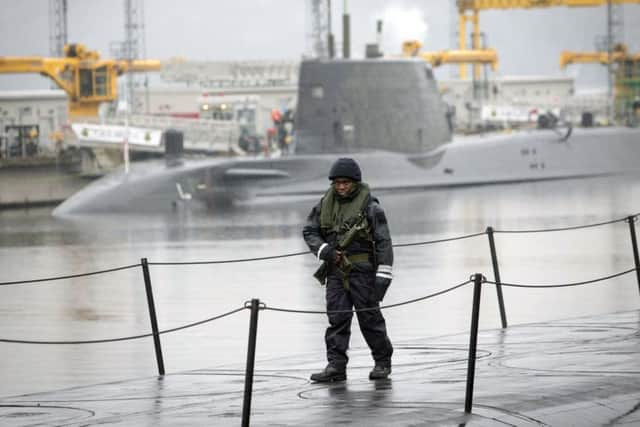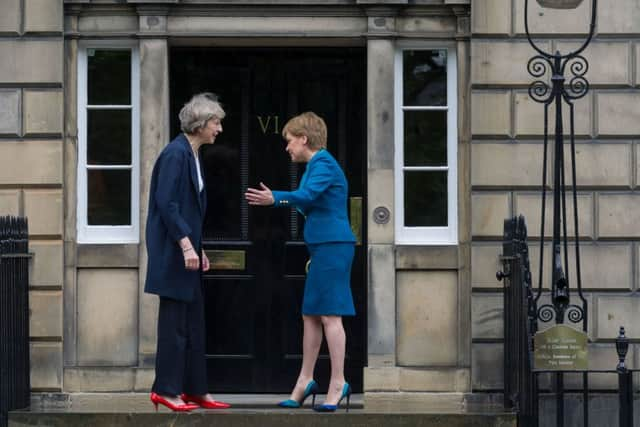Scottish independence: 10 reasons why Yes think they can win


In 2014, Sturgeon, then just Deputy First Minister, was part of the Yes Scotland team that fell short in persuading the country to back independence.
Advertisement
Hide AdAdvertisement
Hide AdThe No side won by 55% to 45% and all but four Scottish authorities voted to remain part of the United Kingdom.


As another campaign looms, we take a look at just some of the persuasive arguments that the Yes side will use.
Scotland has been short-changed by Brexit
Almost immediately after the unsuccessful vote, Yes backing politicians began warning that a ‘material change’ in Scotland’s circumstances could trigger another referendum.
With Scotland backing Remain by a huge margin, it’s hard to argue with the logic that we are being dragged out of the EU against our will.


As Nicola Sturgeon wrote on the EU issue: “That is nothing short of a Democratic outrage – having our own parliament was meant to stop this happening.”
The Tories will be in power for decades
One of the main facets of the Labour campaign to keep Scotland in the Union was that in September 2014 we were mere months away from Prime Minister Miliband.
Governments like David Cameron’s could be changed, so went the argument, but independence can’t be reversed.


Well it didn’t work out like that and Jeremy Corbyn’s leadership could see Theresa May comfortable in Downing Street for years to come.
Advertisement
Hide AdAdvertisement
Hide AdSturgeon herself said that independence was an escape route from “xenophobic, closed, inward-looking Tory Governments.”
A Scottish Foreign Policy
Ok, so an independent Scotland might lack the clout of the UK, with its hundreds of embassies and its seat on the UN National Security Council.


But that would allow us to re-invent our foreign policy, and have an impact on the world that better reflects our values.
Dealing with Donald Trump is just one example, where Theresa May was all too keen to chum along with the President, Scotland’s political leaders have been united in their condemnation.
Even Tory leader Ruth Davidson described Trump as a “knotty pated fool” and a “whoreson” before her party fully embraced the White House’s current occupant.
A better way to treat the vulnerable
Sunday’s ham-fisted intervention from a senior Tory aide to Theresa May that personal independence payments should go to the ‘truly disabled’ not just those ‘sitting around with anxiety taking pills’ was another sign of how the vulnerable are treated within the UK.
From the benefit sanctions to the Bedroom Tax, some of this could be alleviated in Scotland with the transfer of some welfare powers to Holyrood.
As SNP MP Mhairi Black noted in her powerful maiden speech to Westminster: “Food banks are not part of the welfare state, they are symbol that the welfare state is failing.”
Trident
Advertisement
Hide AdAdvertisement
Hide AdThe issue of the UK’s nuclear deterrent, and exactly where it would be located, was a campaign talking point not just at the referendum, but at the UK and Scottish elections of 2015 and ‘16.
The notion that Ed Miliband could turn his back on a Trident renewal as part of a coalition deal with the SNP was used as a powerful weapon by the Tories in 2015.
But the fact remains that the weapons of mass destruction remain on Scottish shores, despite wide spread political opposition.
Alex Salmond asked before 2014: “Can we not declare as a people and as a nation that ‘Enough is enough’ and we’re not standing for it any more?”
We are under-represented
Nothing sums up the under-representation of our views at Westminster as the fact that there is essentially one candidate for Scottish Secretary.
David Mundell is virtually guaranteed to always hold that job under Theresa May by virtue of being the only Tory MP.
After Labour’s only Scottish MP quit the shadow cabinet, Jeremy Corbyn’s choice to represent Scotland’s views is a politician who serves an area of Tyneside in England.
As the oft-repeated joke went, Scotland has more pandas than Tory MP’s, and yet still so much of our lives is dictated by Tory politicians.
Less right-wing politics
Advertisement
Hide AdAdvertisement
Hide AdBrexit and countless national elections have shown that Scotland lacks the appetite for some of the left-wing politics and politicians that have gained traction in other parts of the UK.
While we have a UKIP MEP, that came in a national European election that saw Nigel Farage’s party gain 26% of the vote in the UK, but just 10% of the vote in Scotland.
Similarly, at the 2015 General election, UKIP won 4 million votes across the UK, amounting to just over 12% of votes cast – in Scotland they received less than 2% of the votes.
Academics at the London School of Economics noted that Sturgeon’s claim that the Tories are now “adopting the policies of UKIP” could be a powerful argument in the next referendum.
A whole new style of politics
Never mind just having less right-wingers representing us, Scotland could be a model to the world in doing politics differently.
Despite lofty aims, the Scottish Parliament has descended into a ‘mini Westminster’ system, with the same confrontational debating styles.
With independence, all kinds of exciting ideas about how modern Scottish politics should and could be done might finally be realised.
The Common Weal think tank this week unveiled expert proposals for a people’s second chamber filled with ordinary citizens, a fare more agreeable concept than the current system of the House of Lords, stuffed with party hacks and deep-pocketed donors.
Our own head of state
Advertisement
Hide AdAdvertisement
Hide AdBecause of the avowed pro-monarchy stance of the modern SNP, the spectre of ‘President Salmond’ couldn’t be used effectively as a campaign weapon by the No side in 2014.
The official policy of the Yes campaign was that Queen Elizabeth would remain Scotland’s head of state, just as she is for Canada and Australia.
But the important thing is that we could decide our own destiny – maybe we would vote in a further referendum to retain the current Royal Family.
Maybe we would decide to elect a President, or make the First Minister the head of state. Again, it would be our decision.
While First Minister’s are required by law to pledge allegiance to the Queen, both Alex Salmond and Nicola Sturgeon said in advance: “The Scottish National Party pledges loyalty to the people of Scotland, in line with the Scottish constitutional tradition of the sovereignty of the people of Scotland.”
Our economy (and it’s so much more than oil)
Think of Scotland and energy, and you think of oil – but the truth is that Scotland’s unique position also allows us to be a world leader in renewables.
While Tory Prime Minister’s are caught muttering about how to get rid of the ‘green crap’ Scotland is pushing itself with new climate change targets.
And while oil is struggling due to the current low price, many experts expect that to tick back up in the right direction, and with 20bn barrels still left, who knows what kind of boom that could provide?
Advertisement
Hide AdAdvertisement
Hide AdEverything from tourism to food and drink would contribute to making an independent Scotland a success.
Even arch-unionist David Cameron said “I have no time for those who say that there is no way that Scotland could go it alone.”